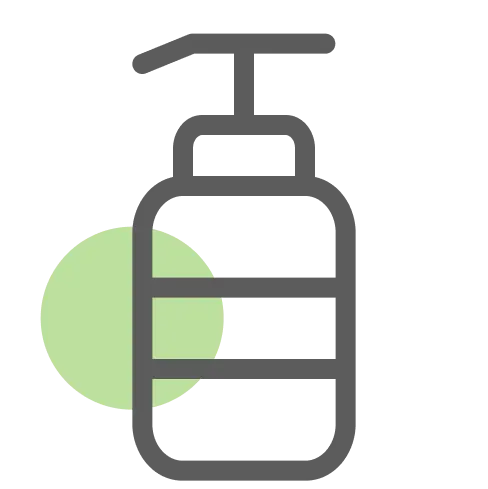Manage Your Hives at Home with These Remedies and Tricks
The first step in at-home hives management is identifying what triggers them. Common culprits include allergic reactions and certain physical stimuli. For a deeper dive into understanding urticaria (hives) and their common causes, you can check out our Understanding Hives article. For now, we’ll focus on hives remedies.
Things to Avoid
First, it’s useful to be aware of common triggers to help minimize your chances of a breakout. Here are a few things to avoid:

Taking a hot shower or bath
Avoid using hot water when bathing or showering, as it can worsen hives and increase itching. Choose lukewarm water instead, which is gentler on the skin and less likely to aggravate the condition.2

Scratching or irritating the area
When you break out in hives, resist the urge to scratch or rub the affected areas, as this can worsen the irritation and potentially lead to infection.2 If the itching is unbearable, try applying a cool compress or using over-the-counter anti-itch creams or lotions to provide relief.

Potential foods causing hives
Identify and avoid foods that may be causing your hives. Common culprits include nuts, shellfish, dairy, and certain fruits.3 Keeping a food diary can help you track what you eat and identify any patterns or triggers. If you’re experiencing severe food allergy reactions, consult with a doctor immediately.

Direct sun exposure to affected area
Protect your skin from direct sunlight, especially on the affected areas.4

Using strong soaps or detergents
Choose gentle, hypoallergenic soaps and detergents to avoid irritating your skin. Strong fragrances and harsh chemicals can aggravate hives, so go for products that are free from these irritants.1

Exposure to extreme temperatures
Both hot and cold temperatures can trigger hives in some people.4 Try to maintain a moderate, comfortable environment and avoid sudden changes in temperature.
Ways to Manage Hives
Once you get a better idea of what sets off your hives, you can take steps to find relief. In the meantime, here are some home remedies for hives you can try:4
Take a cool bath or shower
A cool or lukewarm bath or shower can provide relief by calming irritation and reducing itching.1
Wear loose-fitting clothing
Wearing loose-fitting clothing can prevent further irritation. Consider soft, cotton fabrics that allow your skin to breathe.4
Apply sunscreen
If you need to go outside, protect your skin from the sun by applying a hypoallergenic water-resistant, broad-spectrum sunscreen with an SPF of at least 30. On top of that, wear protective clothing to shield your skin from UV rays and heat, which can intensify itchy hives.5,6
Add oatmeal or baking soda to your bath
When searching, “how do you get rid of hives?”, this remedy often tops the list. Adding finely ground, colloidal oatmeal made for bathing, or baking soda to your bath can make a difference. Either can soothe the skin and reduce itching, preventing further aggravation from scratching.7
Simply mix a cup of oatmeal or baking soda into your bathwater and soak for about 15 minutes. If using oats, try wrapping them in cheesecloth to prevent them from clogging your drain.
Apply aloe vera
Aloe vera has natural anti-inflammatory properties.8,9 Apply pure aloe vera gel to the affected areas for potential relief.10
Reduce stress
Stress hives are more common than you’d think.11 If you frequently feel stressed, consider incorporating certain minimization techniques into your routine: Regular exercise, meditation, and mindfulness practices can help you relax and potentially reduce the occurrence of hives from stress.
Additionally, activities like deep breathing exercises, yoga, or even taking short breaks throughout the day can be beneficial in maintaining a calm state of mind.12
Take OTC medications like ZYRTEC®
Over the counter (OTC) medications like ZYRTEC® can be effective for managing hives. For example, ZYRTEC® Hives provides fast relief that starts to work in 45 minutes.* Always read and follow the full dosage instructions and warnings on the package before use. It’s important to understand that some allergic reactions require the intervention of a healthcare professional — not an over-the-counter medication.
*Applies to 10mg dosage only. Do not use to prevent hives from any known causes such as foods, insect stings, medicines, latex, or rubber gloves, because this product will not stop hives from occurring.
From ZYRTEC® To Home Remedies, You Can Find Hives Relief
Remember: If your symptoms persist or worsen, consult a doctor. Get emergency help immediately if you experience signs of a severe allergic reaction, such as trouble swallowing, speaking, or breathing, swelling of the tongue, or drooling or wheezing, as these may be signs of anaphylactic shock.
References:
Cleveland Clinic. Hives. Accessed February 4, 2025.
American Academy of Dermatology Association. Hives: How to get relief at home. Accessed February 4, 2025.
Mayo Clinic. Hives and angioedema. Accessed February 4, 2025.
American Academy of Dermatology Association. 10 ways to get relief from chronic hives. Accessed February 4, 2025.
American Academy of Allergy, Asthma & Immunology. Summertime Skin Rashes. Accessed February 4, 2025.
Mayo Clinic. Sun Allergy. Accessed February 4, 2025.
Mayo Clinic. Home Remedies: Help with itchy hives. Accessed February 4, 2025.
National Center for Complementary and Integrative Health. Aloe Vera. Accessed February 4, 2025.
Luo X, Zhang H, Wei X, et al. Aloin Suppresses Lipopolysaccharide-Induced Inflammatory Response and Apoptosis by Inhibiting the Activation of NF-κB. Molecules. 2018;23(3):517. Published 2018 Feb 26. doi:10.3390/molecules23030517
National Institute of Environmental Health Sciences. Aloe Vera. Accessed February 4, 2025.
Cleveland Clinic. Are Stress Hives a Real Thing? Accessed February 4, 2025.
Cleveland Clinic. How to relieve stress. Accessed March 12, 2025.
Links to other parties’ articles and websites are provided for convenience only. Kenvue is not responsible for their content.



